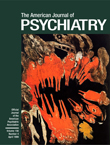Improvement of Schizophrenic Patients With Primary Negative Symptoms Treated With Amisulpride
Abstract
OBJECTIVE: The goal of this placebo-controlled study was to evaluate the efficacy and safety of low doses of amisulpride, an atypical antipsychotic of the benzamide class with high affinity for D2 and D3 dopamine receptors, in the treatment of schizophrenic patients with predominantly primary negative symptoms. METHOD: After completion of a 4-week washout period, schizophrenic patients with primary negative symptoms participated in a 12-week, multicenter double-blind trial of placebo (N=83), amisulpride, 50 mg/day (N=84), or amisulpride, 100 mg/day (N=75). They were evaluated with the Scale for the Assessment of Negative Symptoms, the Scale for the Assessment of Positive Symptoms, the Brief Psychiatric Rating Scale, and the Montgomery-�sberg Depression Rating Scale. RESULTS: Both amisulpride treatment groups showed significantly greater improvement in negative symptoms than the placebo group. Positive symptom scores were low at baseline and changed minimally during the study, suggesting that the improvement in negative symptoms was independent of improvement in positive symptoms. The safety of amisulpride was comparable to that of placebo, and extrapyramidal symptoms were infrequent. Comparable efficacy and safety results were observed with either dose of amisulpride. CONCLUSIONS: These findings confirm and extend those of earlier placebo-controlled studies of low-dose amisulpride in the treatment of patients with predominantly negative symptoms of schizophrenia.



